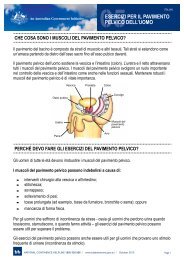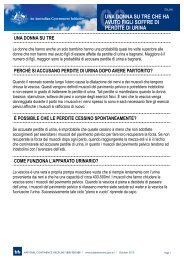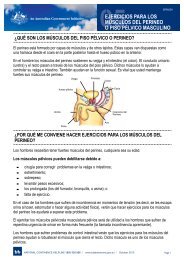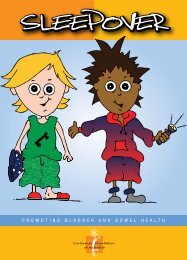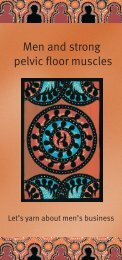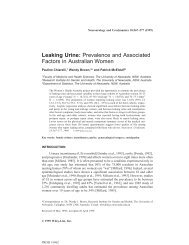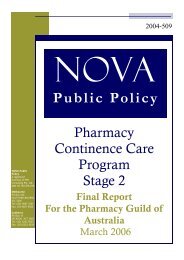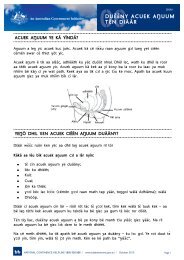Continence Tools for Residential Aged Care - Bladder and Bowel ...
Continence Tools for Residential Aged Care - Bladder and Bowel ...
Continence Tools for Residential Aged Care - Bladder and Bowel ...
You also want an ePaper? Increase the reach of your titles
YUMPU automatically turns print PDFs into web optimized ePapers that Google loves.
14<br />
The <strong>Continence</strong> Assessment Form <strong>and</strong> <strong>Care</strong> Plan (cont’d)<br />
SECTION B: <strong>Bladder</strong> <strong>and</strong> bowel pattern<br />
Most people pass urine 4-6 times a day <strong>and</strong>, 1-2 times<br />
at night (if >65yrs of age). If the resident passes urine<br />
too frequently or infrequently, they may require a medical<br />
assessment. If they need to pass urine at night, it is<br />
important to assess their risk <strong>for</strong> falling. You may need to<br />
develop a continence care plan <strong>for</strong> day <strong>and</strong> another plan<br />
<strong>for</strong> night.<br />
Assessment cue Rationale & care options<br />
During the day, how<br />
many times does the<br />
resident need to pass<br />
urine/go to the toilet<br />
on average (from 7am-<br />
7pm)?<br />
During the night, how<br />
many times does the<br />
resident need to pass<br />
urine/go to the toilet<br />
on average (from 7pm-<br />
7am)?<br />
Does the resident<br />
experience urine leakage<br />
during the day or night?<br />
Does the resident have<br />
a predictable pattern of<br />
passing urine (including<br />
urine leakage)?<br />
Does the need to pass<br />
urine or incontinence at<br />
night make it difficult <strong>for</strong><br />
the resident to go back<br />
to sleep?<br />
The frequency of bowel elimination varies considerably<br />
from individual to individual. Aim <strong>for</strong> residents to use<br />
their bowels regularly (at least 3 times per week) <strong>and</strong><br />
to pass a stool that is soft <strong>and</strong> <strong>for</strong>med (Type 3-4 on<br />
the Bristol Stool Form Scale). Refer to the Three Day<br />
<strong>Bladder</strong> Chart <strong>and</strong> Seven Day <strong>Bowel</strong> chart <strong>for</strong> assistance<br />
answering some of these questions.<br />
Some residents may have medical conditions that affect how often they pass urine.<br />
Congestive Cardiac Failure is one such condition. Urinary tract infections are another.<br />
Constipation <strong>and</strong> faecal impact may also cause bladder symptoms. Medications such as<br />
diuretics can also affect the frequency of passing urine.<br />
Because an older person’s bladder generally holds less urine, people over the age of 65,<br />
often need to pass urine every 3-4 hours. It is important to consider whether or not there<br />
are any medical conditions or reversible factors that are causing the resident to pass<br />
urine frequency <strong>and</strong> if so, how bothersome the resident’s frequency of passing urine is to<br />
them. If a resident passes urine too frequently or has trouble passing urine, this should be<br />
reported to the RN, <strong>Continence</strong> Nurse or GP. Difficulty with passing urine in elderly men<br />
may indicate a problem with the prostate.<br />
It is normal <strong>for</strong> older people to pass more urine at night <strong>and</strong> to have the urge to pass<br />
urine 1-2 times. If this occurs more frequently, it is important to consider whether or not<br />
there are medical factors that need to be investigated. Another factor to consider is the<br />
resident’s risk of falling at night as they attempt to respond quickly to the urge to pass<br />
urine. This will affect your management at night (i.e. consider a bedside commode/call<br />
bell being accessible etc).<br />
There are many possible reasons <strong>for</strong> residents’ experiencing incontinence during the day<br />
<strong>and</strong>/or night. Reasons <strong>for</strong> daytime incontinence may differ from reasons <strong>for</strong> night-time<br />
incontinence. Conducting a continence assessment will help you to identify possible<br />
causes <strong>and</strong> a plan of action. Some residents will respond however to regular <strong>and</strong> timely<br />
toileting assistance.<br />
If the resident has a predictable pattern of passing urine, they may respond to an<br />
individualised toileting program where you either prompt or assist them to the toilet at<br />
times that are based on their usual pattern. Alternatively, if there is no predictable pattern,<br />
they may respond to a fixed time toileting program. This involved taking the resident to<br />
the toilet at fixed regular intervals. If the resident is not suitable <strong>for</strong> a toileting program,<br />
you may choose to put in place a pad check <strong>and</strong> change program. This involves regular<br />
checks of the resident’s continence status <strong>and</strong> changes of pads (if wet).<br />
Getting up to pass urine at night is commonly experienced by older adults. For many, this<br />
is not a problem, however <strong>for</strong> some people, it is disruptive <strong>and</strong> they find it difficult to get<br />
back to sleep.



